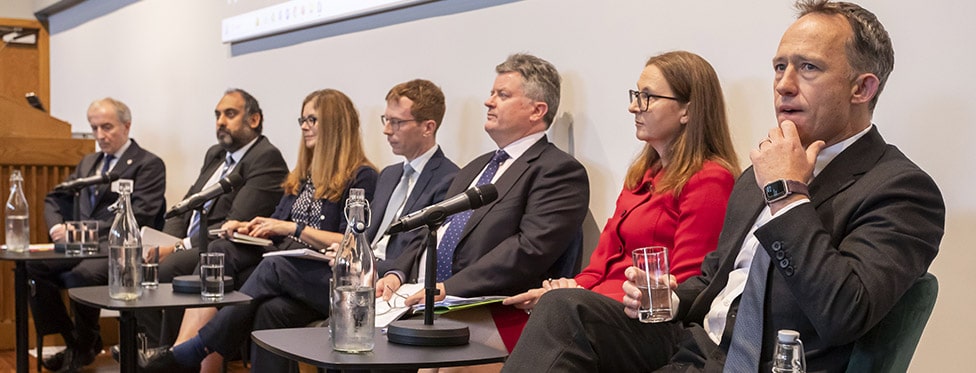 (Pic: Cian Redmond)
(Pic: Cian Redmond)
AI could be ‘first level of ADR’, event hears
Legal-technology expert Prof Richard Susskind has said that, while most short-term predictions “hugely” overstate the effect of AI on the legal profession, most long-term predictions hugely understate it.
He was speaking in a recorded address to a discussion hosted by the Law Society of Ireland’s Alternative Dispute Resolution (ADR) Committee on the future of dispute resolution as part of Dublin International Disputes Week.
Prof Susskind told attendees that the pace of change in the sector was accelerating, predicting that “our legal and social lives will be transformed by 2030 by technologies that have not yet been invented”.
Describing Chat GPT as a “most remarkable development”, he added that it was also “just a new chapter in an ongoing story”.
‘Preventative lawyering’
He told the event that AI's short-term impact was mainly on automation, efficiency, and productivity gains, but in the long term, innovation would do something quite different.
“In my view, the major impact of AI on law and professions is that it will empower organisations and individuals to do for themselves work that used to require human professionals,” he stated.
Using preventative medicine as an analogy, Prof Susskind said that the real opportunity for the legal profession was using AI to provide clients with ‘preventative lawyering’.
Capability
While many panellists in the discussion that followed agreed with Prof Susskind’s longer-term prediction, some argued that he underestimated the effect of current developments.
The chief executive of the American Arbitration Association (AAA) Bridget Mary McCormack told the event that, while the legal sector had been “unbelievably successful at avoiding disruption”, this time, the technology was poised to “run us over”.
Minesh Tanna, who is global AI lead at Simmons & Simmons in London, said that many people under-appreciated the capability of the AI models that were available now.
Mr Justice Liam Kennedy warned lawyers that ‘broadbrush’ models like ChatGPT were not as reliable as other, more curated databases.
“The secret is knowing what technology can do; knowing the right question to ask to get the right answer,” the judge stated.
He also pointed out that a previous debate in the legal profession about the use of emails had never been settled, adding that “the world moved to email while the lawyers were still agonising”.
‘Rough insight’
Stephen Dowling SC (chief executive, Trialview) said that AI models could often give “a rough insight” into a case quicker than a junior lawyer could, but warned that everything still had to be verified.
He argued that the main disruption would come when clients demanded the use of AI for more efficient practice.
Solicitor Brian McMullin argued that emerging technology could be positive for smaller and medium-sized law firms, enabling them to compete with the larger operations.
“I think it will become technology that every lawyer will be able to use,” he added.
‘New ways’ of settling disputes
In a discussion on bias and the reliability of AI, McCormack said that the ultimate promise of the technology was to provide “brand new ways of resolving disputes” and putting more power in the hands of people who needed to resolve disputes, many of whom could not afford lawyers.
For such people, she added, a $20 a month subscription to ChatGPT “might be better than nothing” to assess the merits of a case.
She added that there were some groups, such as women or people of colour, who preferred digital to human mediation. “We sometimes overstate the importance of humans in other parts of this process,” she stated.
Tanna pointed to the irony of humans’ tendency to expect “perfection” from AI, adding that, while we were a long way from relying on the technology for judgments, we were closer to using it to support submissions.
Early-stage assessments
Most panellists agreed that AI could potentially produce early-stage assessments of cases that could enable quicker resolution.
Mr Justice Kennedy said that courts had to be satisfied that people understood the tools and were using them properly, and that, ultimately, a human had to take responsibility.
He added, however, that the use of improved AI systems by parties “could be the first level of ADR”.
Susan Ahern BL, an arbitrator in sports-related disputes, told the event that arbitrations were currently using AI. On mediation, however, she warned that there had to be transparency about what systems were being used.
McCormack told the event that current AI models were already creative, and could already generate ideas for solutions that parties to a case would never have imagined.
Mediation Act
Mr Justice Kennedy also spoke about recent cases in the Irish courts that had highlighted the importance of solicitors’ obligations under section 14 of the Mediation Act 2017.
He told the event that solicitors sometimes had misconceptions about the act, which required them to explain and advise on mediation options to clients, but did not mean that they had to tell the client to mediate. The judge stated that the act contained “no restrictions on a lawyer’s ability to advise clients”.
He also said that initial attempts at mediation, even if unsuccessful, could lead to breakthroughs further down the line.
Gazette Desk
Gazette.ie is the daily legal news site of the Law Society of Ireland